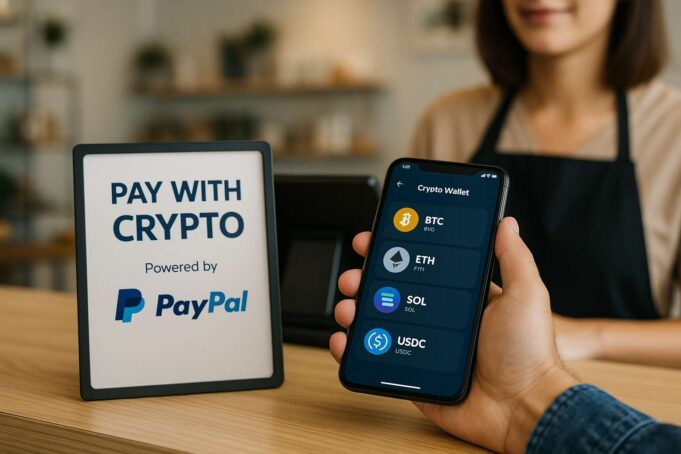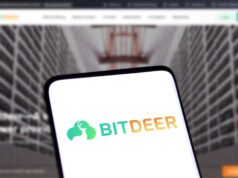PayPal has officially launched its “Pay with Crypto” feature for U.S. merchants. Businesses can now accept over 100 digital assets, including Bitcoin, Ethereum, and Solana, directly at checkout. With real-time settlement into U.S. dollars or PYUSD, the company’s own USD-backed stablecoin, this release marks a turning point in the PayPal crypto strategy. It’s a serious push to move cryptocurrency out of speculative portfolios and into real-world commerce.
The launch comes with a compelling value proposition: a flat 0.99% transaction fee, significantly undercutting traditional card processing costs. Combined with wallet integrations, stablecoin incentives, and cross-chain compatibility, PayPal crypto payments are no longer theoretical. They’re operational.
From Wallet Experiments to Merchant Rails: A Multi-Year Crypto Pivot Comes Full Circle
While the final integrations have come together rapidly in recent months, PayPal’s ambitions in digital assets date back to 2020, when it first enabled users to buy and sell cryptocurrencies like Bitcoin and Ethereum. Over the following years, the company introduced limited checkout features, launched its own PYUSD stablecoin, and quietly secured partnerships and regulatory clarity. Now, with “Pay with Crypto” fully activated for U.S. merchants, PayPal’s multi-year crypto pivot has matured into a full-stack crypto checkout solution. It links users, wallets, and blockchains to real-world commerce.
Recent milestones include:
- April 2025: PayPal added Solana (SOL) and Chainlink (LINK) to its supported crypto assets for U.S. retail users.
- Early July: PayPal stablecoin integration expanded to Stellar (cross-border remittances) and Arbitrum (Layer 2 DeFi).
- July 17: Launch of PayPal World, connecting wallets and fiat partners throughout the world.
- Mid-July: OKX integration to enable crypto purchases in Europe.
- July 28: PayPal Pay with Crypto goes live in the U.S., bringing crypto to checkout.
Each step of the rollout prioritized regulatory compliance, technical scalability, and liquidity aggregation before flipping the switch on consumer-facing utility.
PYUSD: The Engine Behind the Checkout Experience
Central to the strategy is PayPal’s PYUSD stablecoin. The USD-pegged digital asset issued by Paxos Trust Company is backed 1:1 by U.S. Treasuries and cash equivalents. PayPal merchants who choose to settle in PYUSD can do so without volatility exposure. Notably, retail users holding PYUSD within PayPal’s ecosystem currently earn a 4% APY yield on their balances.
Unlike many stablecoins limited to a single blockchain, PYUSD is deployed on Ethereum, Arbitrum, and Stellar, allowing it to serve as a settlement rail, rewards asset, and programmable financial instrument across retail and enterprise environments alike.
PYUSD isn’t just a payment token: it’s PayPal’s mechanism for locking in yield, liquidity, and cross-chain stickiness.
For Merchants: Simplicity, Speed, and Savings
The “Pay with Crypto” feature is designed to be invisible to merchants. Businesses don’t need to manage private keys or custody tokens. Instead, customers pay from any major crypto wallet, such as Coinbase, MetaMask, OKX, Phantom, Kraken, or Binance. PayPal handles the on-chain conversion and fiat settlement automatically.
Key features for merchants:
- Supports 100+ cryptocurrencies
- Flat 0.99% processing fee
- Instant conversion to USD or PYUSD
- No chargeback risk
- No need to touch crypto directly
- Accept Bitcoin and Ethereum with PayPal easily, without needing to handle blockchain infrastructure
This rollout allows PayPal merchants to accept crypto with zero technical complexity and minimal financial risk. By undercutting credit card fees (typically 2.5–3.5%) and eliminating foreign exchange headaches, PayPal crypto payments offer a compelling value proposition, especially for small businesses and cross-border e-commerce platforms.
>>> Read more: Stablecoin Transaction Volume Challenges Payment Giants
Platform Positioning: PayPal as a Global Settlement Layer
With this launch, PayPal is stepping beyond the role of digital wallet provider and entering a space traditionally taken by card networks, FX brokers, and payment processors.
Its approach is notably chain-agnostic and wallet-inclusive. It allows liquidity to flow from crypto-native environments into merchant-facing infrastructure without forcing users to adopt a new system. Combined with the regulatory green light from the SEC, which recently dropped its probe into PYUSD, PayPal is laying the groundwork for becoming a global fiat-crypto settlement layer.
Where Visa and Mastercard dominate card-based fiat payments, PayPal is positioning itself to own the post-card infrastructure; the invisible pipes that connect crypto, stablecoins, wallets, and regulated commerce.
What Comes Next: Beyond U.S. Borders
Today’s launch is U.S.-only, but the fundamentals are clearly in place for global expansion. With OKX integration in Europe and PYUSD now live on cross-border-friendly chains, PayPal is signaling interest in broader use cases, including:
- International crypto checkout
- Enterprise-level programmable payments
- Recurring or subscription-based stablecoin billing
- B2B invoice settlements in stablecoins
- Integration with emerging CBDCs or regional stablecoins
PayPal is also expected to further develop the “PayPal World” platform into a universal payment switchboard, routing fiat and digital assets across partners, rails, and regulatory jurisdictions.
>>> Read more: Kraken Launches KRAK App to Rival PayPal
Conclusion: Crypto Infrastructure, Not Hype
The launch of PayPal Pay with Crypto completes PayPal’s transition from offering crypto as a buy-and-hold investment to embedding it into the plumbing of global commerce. Rather than forcing users to learn about wallets or merchants to handle blockchain protocols, PayPal has abstracted the complexity. It created a seamless interface between traditional finance and Web3.
For the first time at scale, crypto is no longer just a speculative asset. It’s a payment option, a settlement layer, and a strategic moat.
Readers’ frequently asked questions
Can any U.S. merchant use PayPal’s “Pay with Crypto” feature?
“Pay with Crypto” is currently available only to merchants based in the United States. Activation in New York State is subject to regulatory approval by the NYDFS.
Do merchants receive crypto or fiat when a customer pays with crypto?
Merchants receive either U.S. dollars or PYUSD. Paypal converts the customer’s cryptocurrency at the point of sale and handles the exchange automatically.
Which wallets and cryptocurrencies are supported at checkout?
Customers can pay using wallets like MetaMask, Coinbase, Binance, Kraken, OKX, Phantom, and Exodus. Over 100 cryptocurrencies are supported, including Bitcoin, Ethereum, USDC, USDT, Solana, and Chainlink.
What Is In It For You? Action items you might want to consider
Evaluate PayPal as a crypto payment gateway for your business
If you’re a U.S.-based merchant or operate an online store, consider whether integrating PayPal’s “Pay with Crypto” feature could reduce your transaction fees and expand your customer base.
Monitor PYUSD adoption across DeFi and cross-border platforms
PayPal’s stablecoin is now live on Ethereum, Arbitrum, and Stellar. Traders and developers should watch how PYUSD is used in DeFi protocols, enterprise settlements, and upcoming cross-border pilot programs.
Track the expansion of PayPal crypto checkout into international markets
Although currently U.S.-only, PayPal’s crypto rollout is expected to expand. Businesses in Europe, Asia, and Latin America should prepare for potential merchant-facing updates and compliance frameworks.











[…] timing also signals a new competitive front in merchant payments. PayPal, which began rolling out crypto payments for merchants earlier this year through its PYUSD stablecoin, has positioned itself as the bridge between digital […]
[…] collaboration with BitPay strengthens its competitive edge against payment giants such as PayPal, Stripe, and Adyen. All three have moved toward blockchain payment rails. According to ACI […]
[…] joins a growing list of U.S. merchants testing crypto checkout, including AMC, Chipotle, and PayPal. What sets Bealls apart is its reach through hundreds of brick-and-mortar stores and the […]
[…] it uniquely among stablecoin issuers, distinct from unregulated crypto startups. Competitors like PayPal USD , Société Générale’s EURCV, and Circle’s USDC are extending the stablecoin settlement […]
[…] on tight margins and demanding faster processes, stablecoins provide a useful alternative to traditional payment systems, which can be slow, costly, or […]
[…] tool rather than a speculative crypto asset. It also reinforces PayPal’s broader push to integrate stablecoins into mainstream payments while maintaining full compliance with U.S. […]